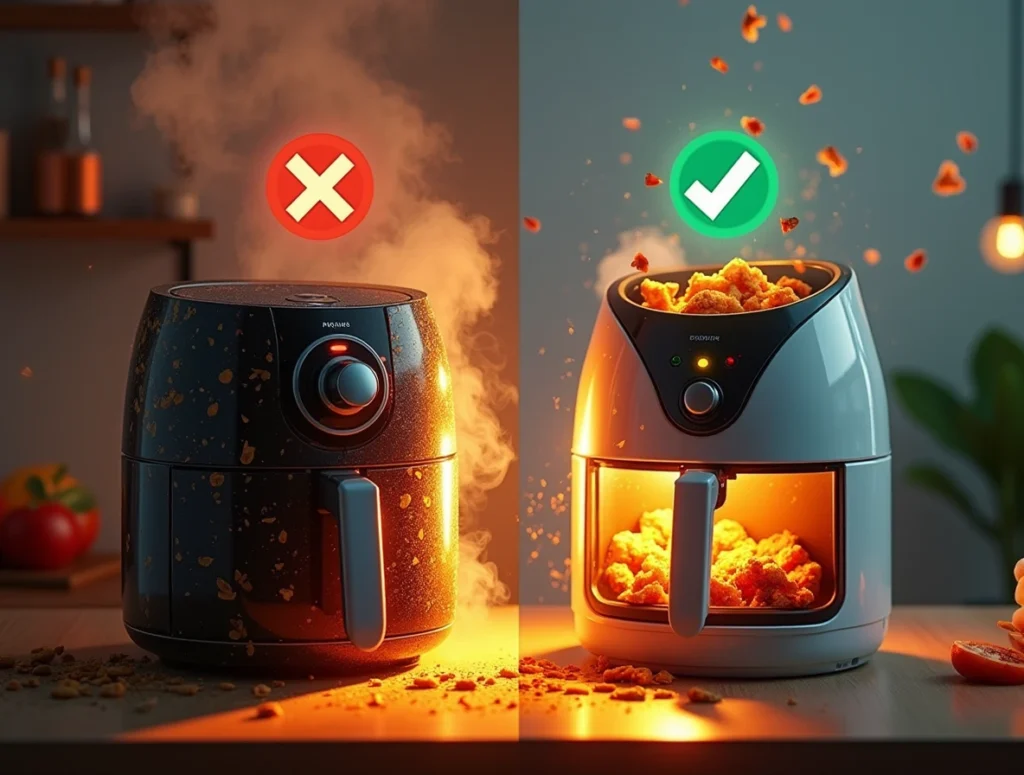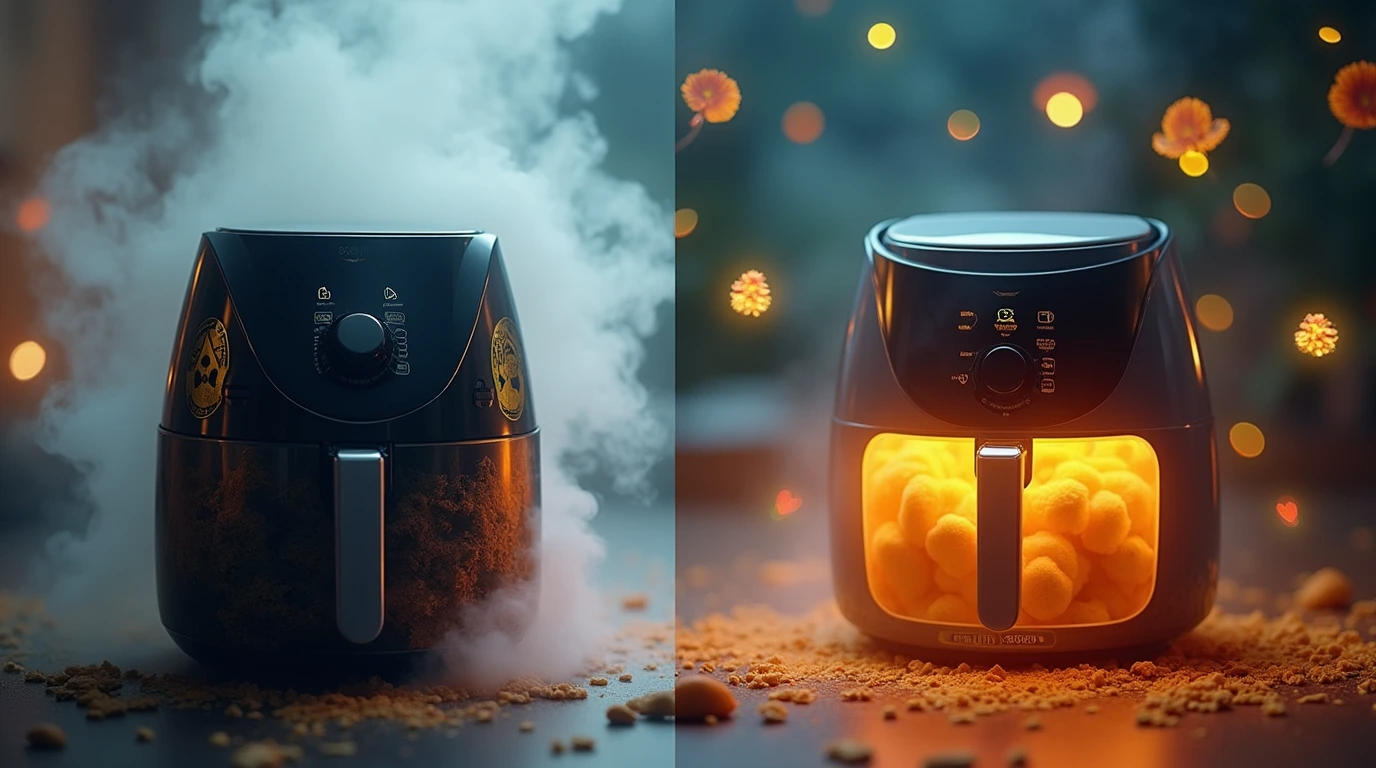Which Air Fryer Is Not Toxic? A Which Air Fryer Is Not Toxic? A Complete Guide to Safe and Healthy Cooking
Air fryers have taken the cooking world by storm due to their convenience, speed, and ability to produce crispy, delicious food with little to no oil. However, with the rise in popularity of air fryers, a new concern has emerged: Are air fryers toxic? Many people are worried about the materials used in these kitchen appliances and the potential health risks they may pose. In this article, we’ll explore the best air fryers that are not toxic, focusing on those made from non-toxic materials like BPA-free plastics and ceramic coatings. By the end, you’ll know exactly which air fryers are safe for you and your family.
What Makes an Air Fryer Toxic?
Air fryers work by circulating hot air around food to produce a crispy outer layer, simulating the effect of deep-frying. However, while air fryers are a healthier alternative to deep-frying, concerns about their safety have been raised, particularly around the materials used in their construction. Toxic chemicals can sometimes leach into food, especially if an air fryer uses unsafe coatings or plastics.
Common Toxic Materials Found in Air Fryers
- Non-stick Coatings (PTFE, PFOA): Many older models of air fryers have non-stick coatings like Teflon, which can release harmful chemicals when overheated. These chemicals, such as PFOA (perfluorooctanoic acid), are linked to serious health problems, including cancer and liver damage.
- Harmful Plastics (BPA, PFAS): Plastics containing BPA (Bisphenol A) or PFAS (per- and polyfluoroalkyl substances) can leach toxic substances into your food, especially when exposed to high heat. These chemicals have been shown to disrupt hormones and contribute to developmental issues.
If you are concerned about these health risks, it’s crucial to choose an air fryer that uses non-toxic materials.

How to Identify a Non-Toxic Air Fryer
Now that we know what makes air fryers potentially harmful, let’s discuss how to choose a safe air fryer. When shopping for an air fryer, there are several key features to look for to ensure it’s free from harmful chemicals.
1. Non-Toxic Coatings
- Ceramic Coatings: Air fryers with ceramic coatings are an excellent choice since they don’t contain harmful chemicals like PTFE or PFOA. Ceramic is a natural material that provides non-stick properties without any associated health risks.
- Stainless Steel Interiors: Another safe option is stainless steel. Many high-quality air fryers feature a stainless steel basket or tray that is durable, easy to clean, and completely non-toxic.
2. BPA-Free and PFAS-Free
- Look for air fryers that are specifically labeled as BPA-free and PFAS-free. These air fryers are made with safe plastics that won’t release harmful chemicals when exposed to heat. Brands that prioritize sustainability and health-conscious consumers often highlight these features.
For more details about ensuring that your kitchen appliances are free of harmful chemicals, check out the FDA guidelines on kitchen appliance safety, which outline regulations and safety standards for non-toxic kitchen products.
3. FDA-Approved Materials
- Ensure that the materials used in the air fryer meet FDA safety standards. Air fryers that are FDA-approved are held to high health and safety regulations, ensuring that the materials are safe for food contact.
The Top 10 Air Fryers That Are Non-Toxic
Now that we know what to look for, let’s dive into the top air fryers that are not toxic. These air fryers are made from safe materials such as ceramic coatings, stainless steel, and BPA-free plastics.
1. Philips Premium Airfryer
The Philips Premium Airfryer is one of the best air fryers on the market, known for its health-conscious design and non-toxic materials. Its stainless steel interior and ceramic-coated basket make it a safe choice for anyone concerned about chemicals in their food.
2. Ninja Foodi Air Fryer
The Ninja Foodi Air Fryer combines the functions of multiple kitchen appliances into one. It features BPA-free plastic and ceramic-coated baskets, making it one of the safest options for cooking without chemicals.
3. Cosori Smart Wifi Air Fryer
The Cosori Smart Wifi Air Fryer offers a non-toxic ceramic coating and is designed for easy cleaning. It also features Wi-Fi connectivity for smart cooking, making it a safe and convenient choice for tech-savvy individuals.
4. Instant Vortex Plus Air Fryer
The Instant Vortex Plus Air Fryer is another excellent option with a stainless steel interior and ceramic-coated trays. Its thoughtful design ensures that no harmful chemicals are released into your food while cooking.
5. Cuisinart TOA-60 Air Fryer Toaster Oven
Cuisinart’s TOA-60 offers both air frying and traditional toaster oven functions. It’s made with BPA-free plastic and stainless steel, ensuring that your food stays safe and free from harmful substances.
6. GoWISE USA GW22731 5.8-QT Air Fryer
The GoWISE USA GW22731 features ceramic-coated baskets, ensuring that food is cooked safely. It also comes with a BPA-free exterior, making it a great option for health-conscious buyers.
7. Black+Decker Purify 2-Liter Air Fryer
The Black+Decker Purify air fryer is another great option, made with BPA-free plastic and non-toxic materials. Its dual convection fans ensure even cooking without the use of chemicals.
8. Dash Compact Air Fryer
The Dash Compact Air Fryer is small, efficient, and made with safe materials. It is designed for single-serving meals and features a ceramic-coated cooking basket.
9. PowerXL Vortex Air Fryer
The PowerXL Vortex air fryer features non-toxic ceramic coating and BPA-free plastic parts, making it a safe and reliable option for anyone concerned about chemicals in their food.
10. Chefman TurboFry 3.6 Quart Air Fryer
The Chefman TurboFry air fryer is made with ceramic-coated baskets and is BPA-free. It’s perfect for anyone looking to prepare healthy, non-toxic meals quickly and efficiently.
How to Choose the Right Air Fryer for Your Health
With so many options available, it can be hard to know which air fryer to choose. Here are some important factors to consider when selecting a non-toxic air fryer:
1. Material Safety
Make sure to choose an air fryer made from safe materials like stainless steel, ceramic coatings, or BPA-free plastics. Avoid models that use Teflon or PTFE coatings which can release toxic chemicals when overheated.
2. Certification Labels
Look for air fryers that have FDA approval or certifications that confirm the absence of harmful chemicals. BPA-free and PFAS-free labels are good indicators that the air fryer is safe for cooking.
3. Price vs. Quality
While it’s tempting to opt for a cheaper model, don’t compromise on safety. Investing in a higher-quality, non-toxic air fryer is a better long-term choice for your health.
Frequently Asked Questions (FAQs)
1. Are All Air Fryers Toxic?
No, not all air fryers are toxic. The toxicity of an air fryer largely depends on the materials used in its construction. While some older models might contain harmful substances like PTFE (found in Teflon coatings) or BPA (Bisphenol A) in their plastics, many newer air fryers are designed with non-toxic materials. When purchasing an air fryer, it’s crucial to look for models that use ceramic coatings, stainless steel interiors, and BPA-free plastics. These materials are safe for food contact and will not release harmful chemicals into your food when heated. Always check the product specifications or packaging to ensure that the model you’re considering is free from harmful substances like PFAS (per- and polyfluoroalkyl substances), which are also found in some non-stick coatings.
2. What Are the Safest Brands of Air Fryers?
Several air fryer brands prioritize safety and non-toxic materials. Some of the safest brands include Philips, Ninja, Cosori, and Cuisinart. These manufacturers use ceramic coatings instead of PTFE or PFOA, and they often opt for BPA-free plastics in their designs. These brands are transparent about the materials they use, ensuring that their customers can make informed choices when selecting a non-toxic air fryer. When shopping for an air fryer, always look for these trusted brands to minimize the risk of harmful chemical exposure.
3. Can an Air Fryer Cause Cancer?
Air fryers themselves are not directly linked to cancer. However, non-stick coatings like Teflon can potentially release harmful chemicals when heated to high temperatures, especially if the coating starts to degrade. These chemicals, including PFOA (perfluorooctanoic acid), have been associated with cancer and other health issues. To avoid this risk, opt for air fryers with ceramic coatings or stainless steel interiors, which are free from toxic chemicals and provide a safer cooking experience.
4. How Do I Know If an Air Fryer Is BPA-Free?
Determining if an air fryer is BPA-free is straightforward. Many air fryer brands explicitly label their products as BPA-free on the packaging or in the product descriptions. If you’re unsure, you can check the manufacturer’s website or look for third-party certifications that confirm the absence of BPA. When purchasing online, reading customer reviews can also be a helpful indicator of whether a particular air fryer model is truly BPA-free. Opting for brands that emphasize safety standards is always a good approach.
5. Is Ceramic Coating Safe for Air Fryers?
Yes, ceramic coatings are generally considered safe and non-toxic for use in air fryers. Unlike traditional Teflon coatings, which contain PTFE and PFOA (potentially harmful chemicals), ceramic coatings are free from these chemicals and provide non-stick properties without posing a risk to your health. Ceramic-coated baskets or trays in air fryers offer excellent heat distribution and easy cleaning without releasing any toxic fumes. This makes them an ideal choice for anyone looking to cook with confidence, knowing their appliance is free from harmful substances. However, it’s important to ensure that the ceramic coating remains intact and is not damaged, as wear and tear could compromise its safety.
Conclusion
Choosing a non-toxic air fryer is essential for ensuring that you prepare healthy meals without exposing yourself to harmful chemicals. As air fryers gain popularity for their ability to create crispy, oil-free dishes, concerns about the materials used in these appliances have become more prevalent. Certain chemicals, like BPA (Bisphenol A), PFAS (per- and polyfluoroalkyl substances), and PTFE (polytetrafluoroethylene), can leach into your food, especially when exposed to high heat. These substances have been linked to a variety of health issues, including hormone disruption, liver damage, and even cancer. Therefore, selecting an air fryer made from safe materials is crucial to reduce these risks.
One of the safest materials to look for is ceramic coatings. Unlike traditional Teflon coatings, which can release harmful chemicals when heated, ceramic coatings are non-toxic, free from PTFE and PFOA, and offer non-stick performance without the associated health risks. Another great option is stainless steel, which is naturally non-toxic, durable, and resistant to leaching harmful substances. For those seeking affordability and practicality, air fryers made from BPA-free plastics provide a safer alternative to older plastic models that contain harmful chemicals. These materials are not only safe but also help maintain the appliance’s efficiency and ease of cleaning.
Before purchasing an air fryer, always verify the product details for FDA approval, BPA-free labels, and PFAS-free certification. These certifications ensure that the appliance meets strict safety standards. By choosing an air fryer that prioritizes non-toxic materials, you can cook your favorite dishes with peace of mind, knowing that your appliance is not releasing harmful substances into your food.
For more in-depth guidance on selecting safe kitchen appliances, refer to the FDA guidelines on kitchen appliance safety.

